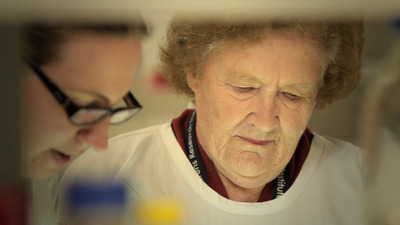A life's work rewarded
This year’s winner of the 2013 CSL Florey Medal, a $50,000 biennial award made by the Australian Institute of Policy and Science, is Melbourne researcher Professor Ruth Bishop.

The medal honours the significant achievements Bishop has made through her life’s work in discovering, understanding and working out how to treat rotavirus.
Back in 1973 Bishop, Brian Ruck, Geoffrey Davidson and Dr Ian Holmes at the Royal Children’s Hospital and the University of Melbourne’s microbiology department found the rotavirus.
Looking initially for a bacterium, they found a virus, called rotavirus for its distinctive wheel-like shape.
Rotavirus is the main cause of severe gastroenteritis in infants and young children - by their third birthday, just about every child in the world has had a rotavirus infection. About half a million children die from it each year.
Until the middle of the last decade, rotavirus caused about 10,000 Australian children to be hospitalised each year with acute gastroenteritis.
As a result of Bishop and her colleagues’ research, vaccination against ‘gastro’ has been part of the National Immunisation Program for all Australian infants since mid 2007. And the number of hospital admissions has dropped by more than 70%.
Fifty million children in the poorest countries will be vaccinated by 2015 by GAVI, the Global Alliance for Vaccines and Immunisation, and their partners, supported by the Bill and Melinda Gates Foundation.
Countries that have introduced rotavirus vaccines have seen a dramatic improvement in child health. Figures available from Bolivia, the first low-income country to take part in the program, show a drop of about three-quarters of all hospitalisations.
GAVI is currently working with its partners to reach the world’s poorest 30 nations by 2015.
Yet Bishop, now in her eighties, won’t be fully satisfied until a new vaccine she helped develop becomes available. It’s intended for newborns, “the only time children in many developing countries are likely to be near a hospital,” she says. The vaccine is currently being trialled in Indonesia and New Zealand.
For more information see Science in Public.
Space conditions can lead to periodontitis, scientists say
Living in zero gravity can lead to periodontitis — a serious condition where the gums...
Personalised brain stimulation helps treat those with depression
By tailoring transcranial magnetic stimulation to each person's unique brain structure,...
Flavonoid-rich foods help to maintain good health
Flavonoids are found in plant foods like tea, blueberries, strawberries, oranges, apples, grapes,...




